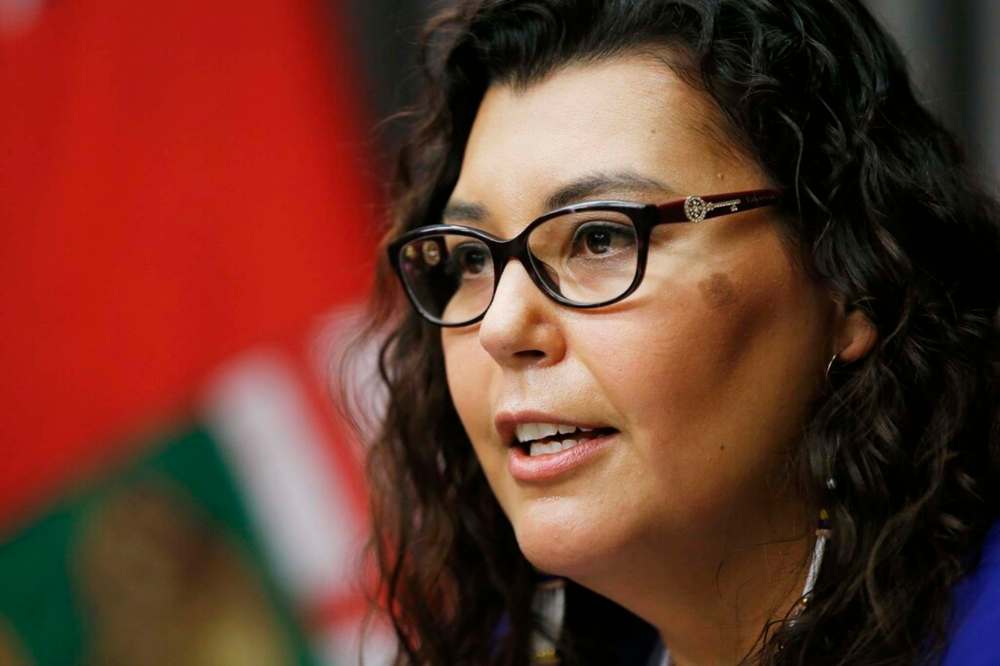Vaccine program must be adjusted to help BIPOC population: report
Advertisement
Read this article for free:
or
Already have an account? Log in here »
To continue reading, please subscribe:
Monthly Digital Subscription
$19 $0 for the first 4 weeks*
- Enjoy unlimited reading on winnipegfreepress.com
- Read the E-Edition, our digital replica newspaper
- Access News Break, our award-winning app
- Play interactive puzzles
*No charge for 4 weeks then billed as $19 every four weeks (new subscribers and qualified returning subscribers only). Cancel anytime.
Read unlimited articles for free today:
or
Already have an account? Log in here »
Hey there, time traveller!
This article was published 04/07/2021 (1224 days ago), so information in it may no longer be current.
Public health officials in Manitoba need to deal with systemic barriers stacked against Black, Indigenous and people of colour to properly prepare for the fourth wave, a new provincial report states.
Manitobans who are Black, Indigenous or people of colour (BIPOC) are much more likely to be hospitalized for COVID-19 and are four times as likely to need intensive care, says a new provincial report on racial disparities in the third wave. Twice as many BIPOC Manitobans were hospitalized during the third wave than the province expected, the report stated, and Manitoba’s age-based vaccine rollout didn’t bridge the gap.
As the province considers the potential future rollout of booster shots, officials need to take race and ethnicity data into account, similar to how First Nations people in Manitoba were prioritized for vaccine eligibility because of the disproportionate impact the virus was likely to have on them. Manitoba didn’t have full access to other race-based data at the beginning of the vaccine rollout, Dr. Marcia Anderson said Monday.

Anderson, medical lead of the First Nations Pandemic Response Co-ordination Team, presented the report on Monday. It shows that for white Manitobans, many hospitalizations could have been prevented if they had been vaccinated earlier, but the same wasn’t true for BIPOC people, who landed in hospital at younger ages and with fewer underlying chronic conditions, compared with white people.
“Some members of BIPOC communities have felt stigmatized by messages that people in hospital did something wrong by not following orders, not getting tested or not getting vaccinated,” Anderson said, adding public-health officials will change policies to ensure vaccine accessibility. She noted people from BIPOC communities were more likely to have to wait longer to get their vaccine, some because they had to isolate as contacts of a case of COVID-19.
Long-term investments in housing and education are necessary, Anderson recommended.
Asked what public-health officials are doing to deal with the racial disparity, Dr. Brent Roussin said they’re still providing isolation accommodations for people who can’t isolate at home, and working on targeted vaccine access.
“We know that eligibility isn’t sufficient for much of our population. We need to ensure we’re bringing the vaccine to harder-to-reach populations, so we’ll continue to do this. We know certain employment and workplace factors have played a significant role, so we’ve continued to work on trying to address those factors in that targeted approach,” he said.
In the spring, as a way to urge Manitobans to get vaccinated, the provincial government’s messaging focused on the high number of hospital patients who were unvaccinated, even though some of them had booked appointments or weren’t yet eligible to receive their first dose of vaccine.
Roussin said they were trying to communicate the risk of not getting vaccinated, as opposed to laying blame.
NDP health critic Uzoma Asagwara said it was unfair of Premier Brian Pallister to blame people who had to be hospitalized, and called for a plan to address the inequities.
“The premier and the minister of health should already have a plan in place to make sure that those most affected communities are going to be protected and adequately resourced moving forward,” Asagwara said.
Manitoba first began publicly reporting race-based data on the effects of COVID-19 in May 2020. Roussin acknowledged some people felt stigmatized by the release of that data.
A fourth wave of the pandemic is expected to hit Manitoba by fall, public-health officials have acknowledged, likely driven by the B.1617 delta variant. Roussin didn’t have an updated timeline Monday for when Manitobans can expect to see new provincial projections that take into account the delta variant.
On Monday, four additional COVID-19 deaths and 177 new cases of the virus were announced: 48 cases on Saturday, 64 cases on Sunday, and 65 cases Monday. There are 150 patients hospitalized for COVID-19 in Manitoba and another six ICU patients being treated in Ontario. No patient has been transferred out of the province since June 9.
— with files from Carol Sanders
katie.may@freepress.mb.ca
Twitter: @thatkatiemay

Katie May
Reporter
Katie May is a general-assignment reporter for the Free Press.
Our newsroom depends on a growing audience of readers to power our journalism. If you are not a paid reader, please consider becoming a subscriber.
Our newsroom depends on its audience of readers to power our journalism. Thank you for your support.


